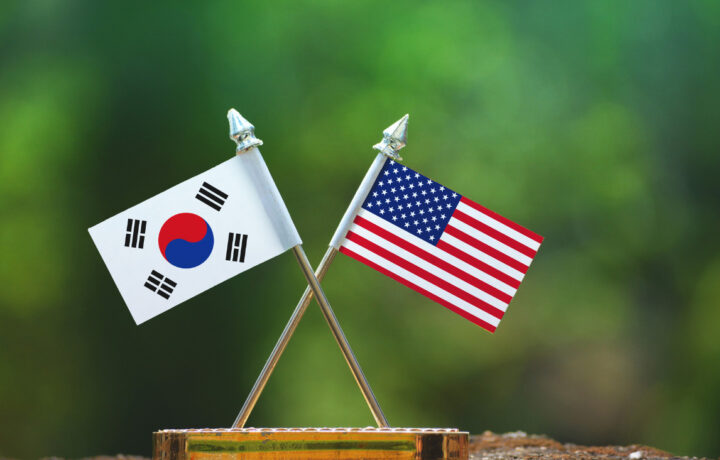United States Army soldiers and their families deployed to South Korea will have more time to enjoy the local flavors, including kimchi and bulgogi, listen to K-Pop music, and experience the culture after the Pentagon approved a directive that will extend tours to the Asian nation. The Department of Defense (DoD) gave the go-ahead for the implementation of a new 3-2-1 tour model beginning October 1, 2025.
It will extend the standard accompanied tour length from 24 months to 36 months, while unaccompanied tours will now be 24 months, the U.S. Army confirmed. Those soldiers who seek to bring their family but are disapproved for the accompanied tour will be given the option for a short 12-month dependent-restricted tour, which can be authorized only if a commander is unable to accommodate a requested accompanied tour.
“The primary objective of the 3-2-1 tour policy is to enhance operational continuity, mission readiness and align Korea tours with those of most other overseas locations,” the Army explained.
The goal of extending the accompanied and unaccompanied tours is to reduce personnel turnover in the region, build “more cohesive teams,” and gain deeper cultural integration as well as a greater understanding of the operational environment in the country. That can provide improved continuity, leading to more effective mission execution, and a better quality of life for the soldiers deployed and their families.
“Shorter tours do not provide the necessary consistency and experience to support readiness and deterrence,” said Brig. Gen. Dale S. Crockett, Eighth Army, acting commander.
“The conditions-based 3-2-1 tour model will enhance our readiness and lethality by increasing our interoperability with our ROK partners and keeping our personnel engaged in effective and purposeful training,” added Crockett. “By reducing the frequency of assignment turnover, the model minimizes readiness gaps for ongoing missions, critical coordination, and team dynamics, ensuring we are always ready to fight tonight.”
Tailoring the Tours
The U.S. Army said that the flexibility of the conditions-based model will further allow commanders in South Korea to tailor assignments to unit needs and operational demands. The service claims it will “enhance training, reduce turnover and improve mission continuity,” but also provide soldiers with greater satisfaction by enabling stability and meaningful professional development.
The extended deployment promises to provide commanders the ability to lead units better and manage talent. The 3-2-1 deployments will also help soldiers balance mission demands and family needs, reduce family separation, and ensure readiness. That could aid in operational success from the unit to the strategic level.
“Our families are the cornerstone of everything we do,” suggested Crockett. “They support our heroes and deserve the support of our Army. They’ll get it here with expanded state-of-the-art facilities, the stability to succeed academically, personally, and professionally, and the opportunity to enjoy all Korea has to offer.”
Change of Policy
This will change the former policy that was established decades ago, which had seen shorter deployments. This change is meant to bring South Korea assignments in line with other overseas postings, notably those to Germany, Japan, and Italy.
There are currently about 40,000 active duty troops, civilians, and family members deployed to nine military bases throughout South Korea, including Camp Humphreys, headquarters of the Eighth United States Army. It is currently the largest overseas Army installation in the world with new family housing, large DoDEA schools, and recreational amenities.
According to the U.S. Army, the 3-2-1 tour policy will be phased in starting October 1, 2025, with full implementation anticipated by October 2027. It isn’t meant to impact the number of troops stationed in South Korea, as Congress mandates that number. The 2026 annual defense bill has called for 28,500 troops to be stationed in the country.
“Service members currently stationed in South Korea will not be affected by this change. However, those arriving after the implementation date will be subject to the new tour lengths,” the Army added.
The new deployment policy follows the Pentagon’s announcement in May that spending on permanent change-of-station (PCS) would be cut 10% in 2027, and continue to see annual cuts until it reaches 50% by 2030.
South Korean Culinary Contest Winners Announced
The change in deployment lengths wasn’t the only announcement coming from the Eighth Army, which announced the winners of its top chef competition held across five bases earlier this month.
According to a report from Stars & Stripes, Sgt. Timothy Santiago, of the Bronx, N.Y., and Spc. Fernando Campbell, of Sparta, Tenn., earned first place in the noncommissioned officer and junior enlisted categories in the two-part challenge that tested both tactical knowledge and culinary skills. It included a formal military board that required competitors to answer questions on Army regulations, food service doctrine, and leadership principles, followed by a 90-minute “cookoff,” where each competitors were given mystery ingredients that were used in a full-course meal.



